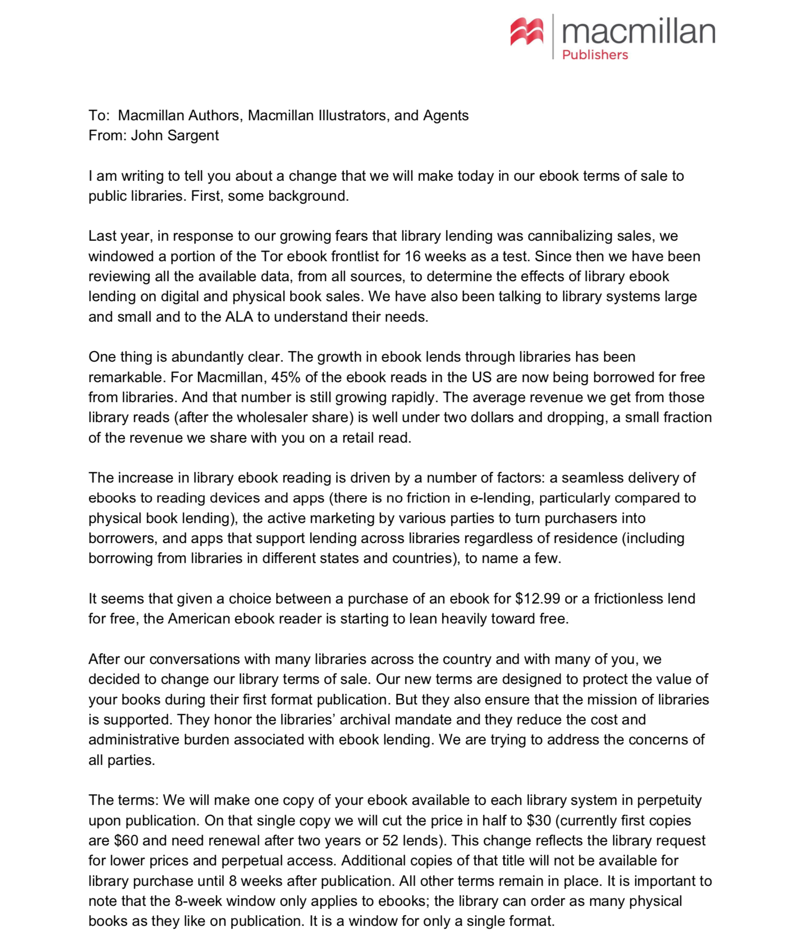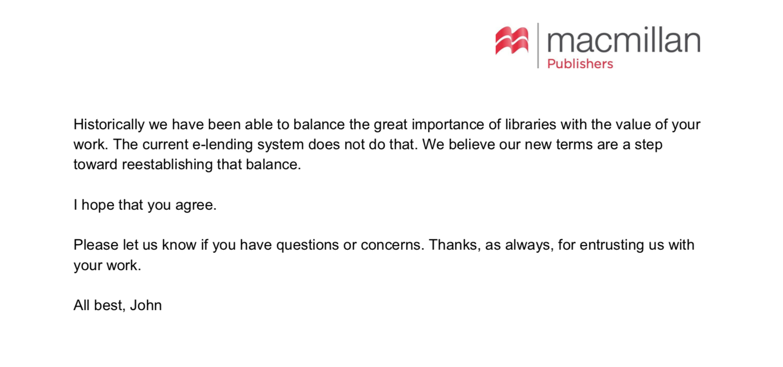E-Books: Macmillan Announces New Lending Model For Libraries; ALA Denounces Change in Statement
All Updates Available at the Bottom of This Post
(Latest Update: October 30, 2019)
October 30, 2019 ALA Releases Response to Letter by Macmillan CEO
October 29, 2019 Letter From Macmillan Publishers CEO John Sargent to Library Community
—
From the WSJ (Subscribers Only):
One of the country’s largest book publishers is changing the way it sells e-books to libraries, whose increasingly popular digital-book borrowing apps are taking a toll on its sales.
[Clip]
“Library reads are currently 45% of our total digital book reads in the U.S. and growing,” Macmillan Chief Executive John Sargent said in an interview. “They are cannibalizing our digital sales.”
Macmillan’s new policy will take effect on Nov. 1, said Mr. Sargent. After a book has been out for eight weeks, libraries will be able to buy as many additional digital copies as they want. Macmillan said the delay, known in publishing circles as “windowing,” is intended to boost the sale of new books, both digital and hardcover.
Read the Complete Article
From Andrew Albanese, Publishers Weekly:
Macmillan is now the fourth Big Five publisher to change its terms for digital content in libraries in recent months—but its changes, and the views expressed by Macmillan CEO John Sargent, are by far the most unique and contentious of the group. In a July 25 memo (addressed to authors, illustrators, and agents), Sargent not only delivered the news of Macmillan’s library e-book changes, he basically called out libraries for depressing author payments.
“It seems that given a choice between a purchase of an e-book for $12.99 or a frictionless lend for free, the American e-book reader is starting to lean heavily toward free,” Sargent wrote. “Our new terms are designed to protect the value of your books during their first format publication. But they also ensure that the mission of libraries is supported.”
Full Text of Statement From Macmillan CEO
Direct to Macmillan Letter
2 pages; PDF.
ALA Response
Full Text of Statement from the American Library Association:
The American Library Association (ALA) denounces the new library ebook lending model announced today by Macmillan Publishers. Under the new model, a library may purchase one copy upon release of a new title in ebook format, after which the publisher will impose an eight-week embargo on additional copies of that title sold to libraries.
“Macmillan Publishers’ new model for library ebook lending will make it difficult for libraries to fulfill our central mission: ensuring access to information for all,” said ALA President Wanda Brown. “Limiting access to new titles for libraries means limiting access for patrons most dependent on libraries.
“When a library serving many thousands has only a single copy of a new title in ebook format, it’s the library – not the publisher – that feels the heat. It’s the local library that’s perceived as being unresponsive to community needs.
“Macmillan’s new policy is unacceptable,” said Brown. “ALA urges Macmillan to cancel the embargo.”
The new Macmillan ebook lending model is an expansion of an existing policy that went into effect in July 2018, when the company, without warning, issued a four-month embargo applying solely to titles from the company’s Tor imprint. At the time ALA stated that the delay would hurt readers, authors and libraries.
Since last fall, Hachette Book Group (HBG) and Penguin Random House (PRH) have eliminated “perpetual access” for libraries and replaced it with a two-year access model. Simon & Schuster changed from a one-year to two-year access model. While re-evaluating their business models, none of these firms implemented an embargo—deciding that equitable access to information through libraries is also in their business interest. HarperCollins continues with its 26-loan model. Macmillan now stands alone in its embargo policy among the largest (Big 5) publishers.
Macmillan will decrease its price to $30 for the single initial copy of an ebook. Unlike other Big 5 publishers, this copy of Macmillan titles come with perpetual access. After the embargo period, additional copies will be available for $60 per copy for two years of access.
“This new embargo is the latest evidence of a troubling trend in the publishing industry,” said Brown. “ALA is developing a strategy to address this trend in the long term. Following the model of ALA’s former Digital Content Working Group, this advocacy effort will extend several years, not several months, and will not be limited to one company in the publishing ecosystem. ALA will push harder and explore all possible avenues to ensure that libraries can do our jobs of providing access to information for all, without arbitrary limitations that undermine libraries’ abilities to serve their communities.
“In the short term, ALA calls on library customers of Macmillan Publishers to tell CEO John Sargent they object to the publishing company’s new policy.”
Macmillan Publishers
Attn: Mr. John Sargent, CEO
120 Broadway Street
New York, NY 10271
Phone: 646-307-5151
Email: press.inquiries@macmillan.com
Twitter: @MacmillanUSA
——
UPDATES
UPDATE 22 (October 30) ALA Releases Response to Letter by Macmillan CEO
Update 21 (October 30) ALA Delivers #ebooksforall Petition, With 160,000+ Signatures, To Macmillan Publishers
UPDATE 20 (October 29) Letter From Macmillan CEO John Sergeant to Library Community
UPDATE 18 (October 22) King County Library System Boycotts Macmillan Publishers’ eBook Embargo
UPDATE 17 (September 13) Ohio Library Council Board Calls for Publishers to Reverse Library eBook Policies
UPDATE 16 (August 28) Bibliotheca Calls Out Amazon for Meddling in the Library E-book Market (via Publishers Weekly)
UPDATE 15 (August 27) bibliotheca (cloudLibrary) Leadership Comments on Publisher Model Changes
UPDATE 15 (August 27) bibliotheca (cloudLibrary) Leadership Comments on Publisher Model Changes
UPDATE 14 (August 27) Seattle Public Library “Denounces” Publisher’s New E-book Policy (via The Stranger)
UPDATE 13 (August 20) Cincinnati: Library Wait Times For E-Books, E-Audiobooks are About To Get Longer (via WVXU)
UPDATE 12 (August 19) Local Libraries Combat Attempt To Limit Access To E-Books, Digital Material (via Dayton Daily News)
UPDATE 11 (August 13) Macmillan Spat Over E-Books Highlights Library Woe — and that’s Bad News For Readers (via Chicago Tribune)
UPDATE 10 (August 12) Macmillan’s New Library Ebook Lending Model and Its Effect on Libraries (via BookRiot)
UPDATE 9 (August 8) North Dakota State Library Denounces Publisher’s New Policy (via KXNet.com)
UPDATE 8 (August 5) ‘The E-book War–TSLAC [Texas State Library and Archives Commission] is Watching Closely”
UPDATE 7 (August 2) CNN Op/Ed: “Libraries are Fighting to Preserve Your Right to Borrow E-Books” by Jessamyn West
UPDATE 6 (August 1): OverDrive Founder and CEO, Steve Potash, Comments on Changes to Macmillan’s E-Book Lending Model
UPDATE 5 (July 31) Public Library Association Joins Its Parent Organization (ALA) in Condemning New Macmillan Lending Model
UPDATE 4 (July 30) Statement on MacMillan Publishers U.S. Lending Model Change for Public Libraries (via Vancouver Public Library)
UPDATE 2 Blog Post & Brief Statement from Panorama Project
While Macmillan’s embargo is disappointing news for libraries, authors, and, most importantly, readers—it reinforces the need for a cross-industry initiative to identify ways publishers and libraries can continue to support their intrinsically related missions while delivering mutually beneficial outcomes. We encourage more publishers, independent booksellers, authors, agents, and allied associations and vendors to collaborate with us and help measure the real impact libraries have on developing readers, driving book discovery, and generating book sales in their local communities, and beyond.
Note: “Initial funding for the Panorama Project is being provided by Rakuten OverDrive”
Direct to Complete Post
UPDATE 1 Article by Matt Enis, Library Journal
On a positive note, libraries with small ebook collections—as well as those concerned specifically with digital preservation and the maintenance of long-term backlist collections—may embrace Macmillan’s decision to offer one perpetual license per library for a lower initial price upon publication. Previously, the publisher had not offered perpetual licenses to libraries. Sargent wrote that the new terms had been decided upon following discussions with “library systems large and small and to the [American Library Association] to understand their needs.”
In a recent interview with sf author Jason Sanford, Fritz Foy, president and publisher of Macmillan’s Tom Doherty Associates, noted that these discussions had revealed to Macmillan that ebook pricing and licensing terms impact libraries differently based on the size of the library system. For example, while a large, urban system might easily loan out a new bestselling ebook 26 times during the first year of a two-year license, a small or rural library may not match that, making the smaller library’s per-circ costs much higher.
Read the Complete Article
Filed under: Archives and Special Collections, Associations and Organizations, Companies (Publishers/Vendors), Digital Preservation, Funding, Interviews, Jobs, Libraries, Management and Leadership, News, Patrons and Users, Preservation, Profiles, Public Libraries, Publishing
About Gary Price
Gary Price (gprice@gmail.com) is a librarian, writer, consultant, and frequent conference speaker based in the Washington D.C. metro area. He earned his MLIS degree from Wayne State University in Detroit. Price has won several awards including the SLA Innovations in Technology Award and Alumnus of the Year from the Wayne St. University Library and Information Science Program. From 2006-2009 he was Director of Online Information Services at Ask.com.




